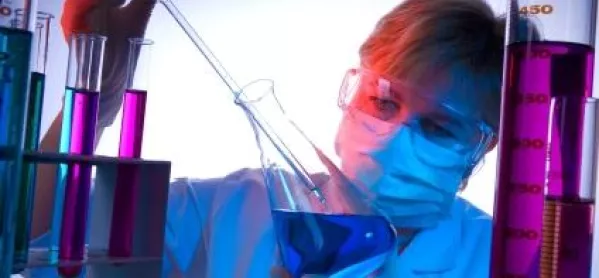Gone are the days when I could wind a piece of magnesium ribbon around a pair of scissors and ask a child to hold it at arm’s length while I set fire to it. And when I do the experiment where the lid blows off a treacle tin to demonstrate how hot air expands, I sometimes think I should move all the children to the back of the hall.
I often wonder how I survived as a child. I loved chemistry, and long before I entered secondary school and knew what the subject was called, my little chum Clive and I were mixing explodable potions and testing them in his dad’s garden shed. Heaven knows how we didn’t suffocate from the fumes, let alone the danger from these highly combustible substances.
The thing was, you could buy an amazing range of chemicals from the local chemist. All you needed was a plausible excuse. “My dad is showing me how to make invisible inks . have you got any copper sulphate crystals?”
“Certainly, son, but when you dissolve them in water, just make sure you don’t drink it. They’re poisonous and it could kill you.”
And that was that - the onus was on you. And if you did happen to poison yourself, there wouldn’t be any mileage in your mum trying to get compensation from the chemist.
Clive always seemed to have enough dangerous knowledge to keep us living on the edge. I remember hanging around the back of the local cinema and persuading the projectionist to give us a few offcuts of nitrate film - on the pretext that my dad had a home projector but no film clips to show on it. Had the projectionist known we intended to wrap it up tightly and set fire to it - it was highly inflammable and made a spectacular smoke bomb - I doubt whether he would have been so willing to give it to us.
Somehow, Clive had learnt that gunpowder was made from saltpetre, sulphur and charcoal. He had graduated to this from wrapping red-tipped matches tightly in silver foil and putting them on the gas ring, where they made a startling explosion that frightened us and caused the cat to bolt for the door, so we only did this when his mother was out shopping.
Again, the chemist readily supplied the saltpetre and sulphur, and we discovered that lighting a mixture of the two produced lethally hot bubbles. Like molten lava, they rolled down the plank of wood we were experimenting on, burning a deep furrow as they went. Had the bubbles dropped on to us, I suspect they would have burned their way right through our flesh in seconds.
The main problem was getting the mixture to fire up, although we soon found that Jetex fuse wire, available from toy shops and used to ignite model plane engines, performed exceptionally well. The downside was the cost - sixpence a tin - so a lot of empty lemonade bottles had to be taken back to the grocers to earn that kind of money.
Sadly, I lost touch with Clive shortly after he’d been grounded for emptying a can of Andrews Liver Salts into his grandmother’s commode. When she’d risen in the night to relieve herself, the resulting effervescence had caused her to seek immediate and urgent medical assistance.
Health and safety might not have been there to protect us, but - Wow! - chemistry was such fun in those days.
Mike Kent is headteacher of Comber Grove Primary in Camberwell, south London. mikejkent@aol.com.

